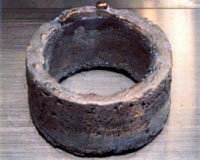 |
Waterloo, Ontario (UPI) Jul 2, 2009 A think tank says the Canadian uranium industry may be better served enriching the mineral itself rather than exporting the raw material and buying back enriched uranium. The Center for International Governance Innovation, which has its offices in Waterloo, Ontario, this week posted "Uranium Enrichment in Canada" on its Web site, concluding that an increase in the number of nuclear plants to generate electricity could be good for Canada's substantial uranium industry. Canada gets about 15 percent of its power generation from nuclear plants, but there are discussions for additional facilities. Additional uranium demand in Canada could be realized as soon as 2012, CIGI said. The CIGI release states that "concerns about greenhouse gas emissions, high oil prices and energy security have caused a major change in outlook, with significant increases now being forecast in nuclear power production. This in turn is likely to lead to increased demand for uranium." To meet that demand, CIGI looked at the uranium industry from mining through enrichment. While Canada is the world's largest producer and exporter of uranium, it doesn't have the capability to enrich uranium. "Our view is that a possible enrichment plant would have to be a private undertaking and that there is no necessity for Canadian governments in such a partnership," said David P. Jackson and Kenneth W. Dormuth, co-authors of the CIGI report. "A major barrier might be the acquisition of the technology needed for enrichment or persuading an existing enrichment company to set up a plant in Canada, as enrichment technology is closely held for non-proliferation and business reasons." Uranium prices peaked at about $120 a pound in 2007 but sagged to about one-third of that by April 2009. This week, uranium is listed at $52 a pound. Further price pressure is predicted should talks next week between U.S. President Barack Obama and Russian President Dmitry Medvedev result in a significant reduction in nuclear arms. Bloomberg News reported recently that Paris's Nuclear Energy Agency estimates that the United States and Russia have stockpiled as much as 600,000 tons of uranium for weapons. Much of that could be released to the market if diplomacy leads to a lessened need for uranium in weaponry. But that's a rather large "if" while an increase in worldwide power-generation demand is pretty much a given. Should Canadian companies decide to get into the processing business, they will be looking for both domestic and international markets for uranium. Nuclear power suffered a poor image with the people who authorize their construction. But given that nuclear power is relatively environmentally cleaner than current fossil fuel plants and much cheaper than development of alternative sources, that sector of the power-generation has seen a resurgence. Several countries in Asia are looking to increase their power-generation capacity through nuclear reactors. Canada produced about 21 percent of the world's uranium in 2008. It has proven reserves of nearly 500,000 tons, with its largest mines in northern Saskatchewan. Only Australia has larger proven reserves. Share This Article With Planet Earth
Related Links Nuclear Power News - Nuclear Science, Nuclear Technology Powering The World in the 21st Century at Energy-Daily.com
 SKorea proposes independent plutonium reprocessing
SKorea proposes independent plutonium reprocessingSeoul (AFP) July 2, 2009 South Korea's foreign minister called Thursday for a new nuclear accord with the United States that would allow his country to reprocess plutonium for commercial civilian use. An accord signed by the two close allies in 1974 stops South Korea separating plutonium from spent fuel from its civilian nuclear power plants. The pact expires in 2012. "It's necessary to revise the US-SKorea ... read more |
|
| The content herein, unless otherwise known to be public domain, are Copyright 1995-2009 - SpaceDaily. AFP and UPI Wire Stories are copyright Agence France-Presse and United Press International. ESA Portal Reports are copyright European Space Agency. All NASA sourced material is public domain. Additional copyrights may apply in whole or part to other bona fide parties. Advertising does not imply endorsement,agreement or approval of any opinions, statements or information provided by SpaceDaily on any Web page published or hosted by SpaceDaily. Privacy Statement |